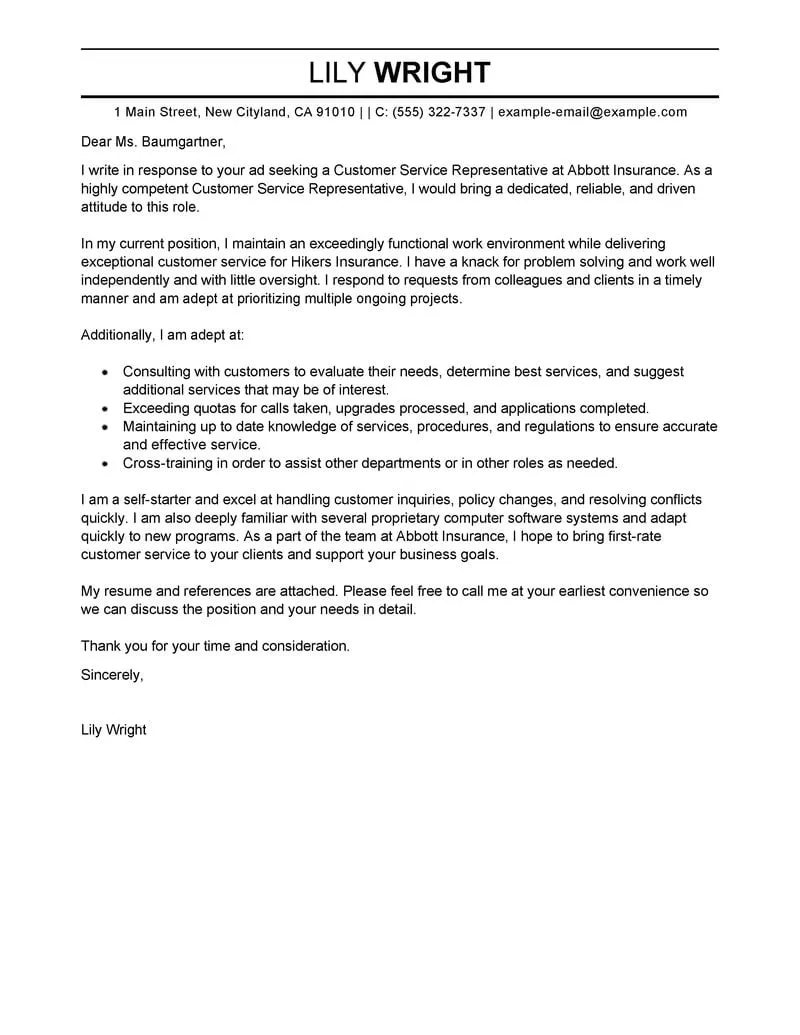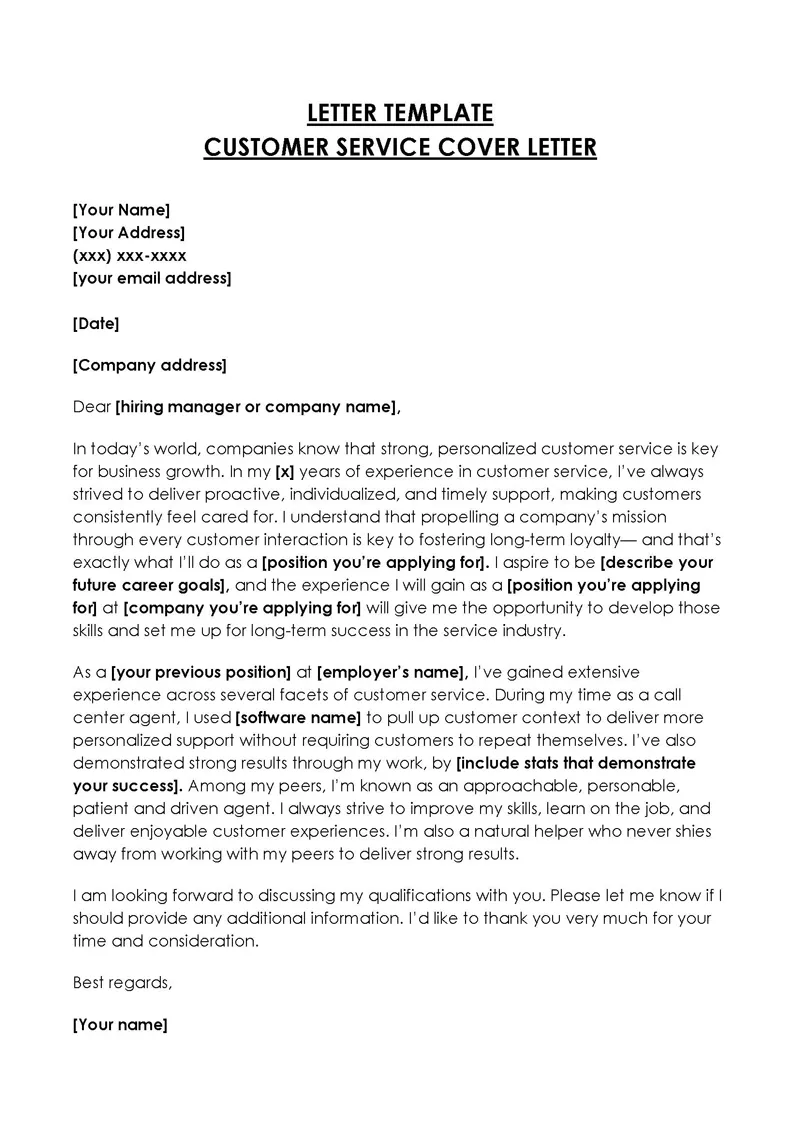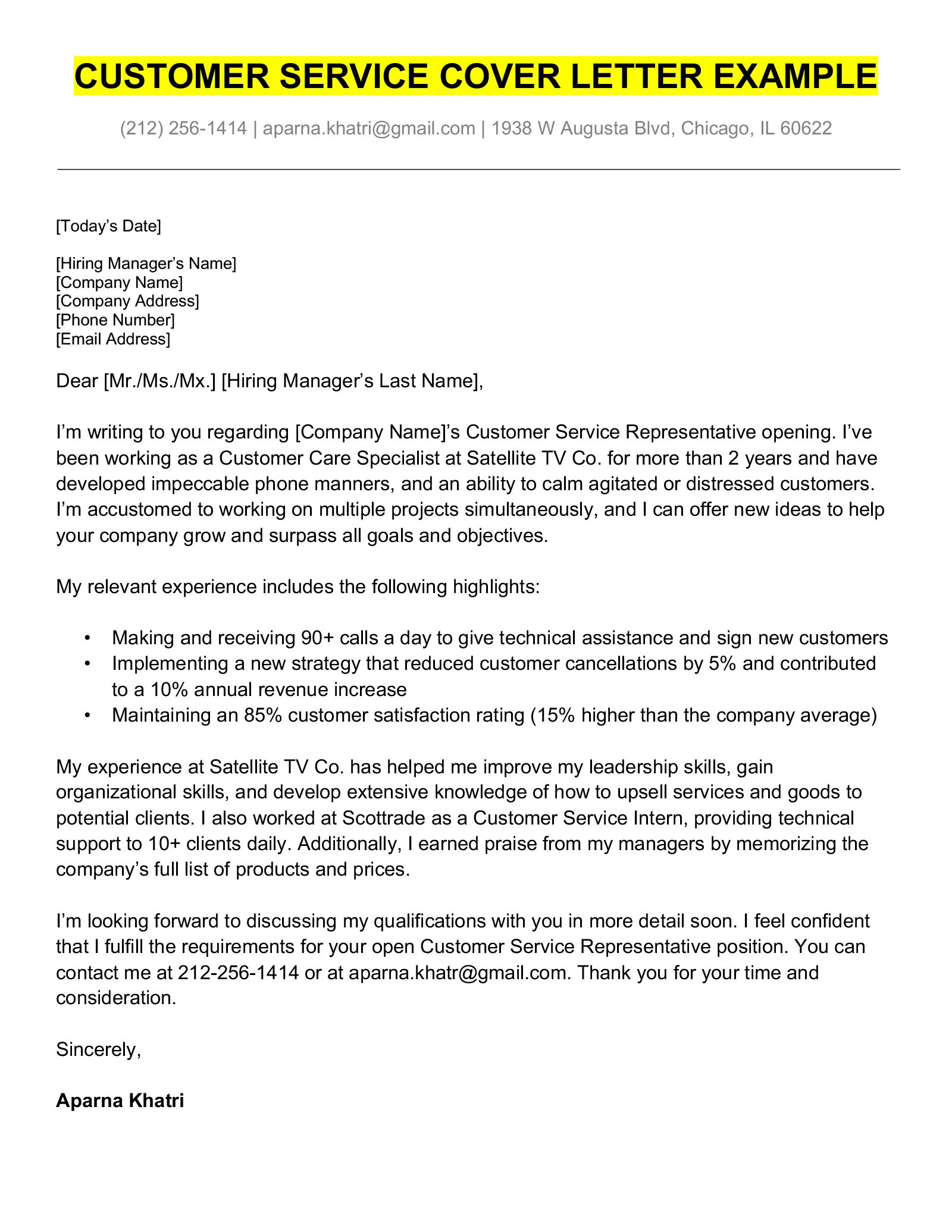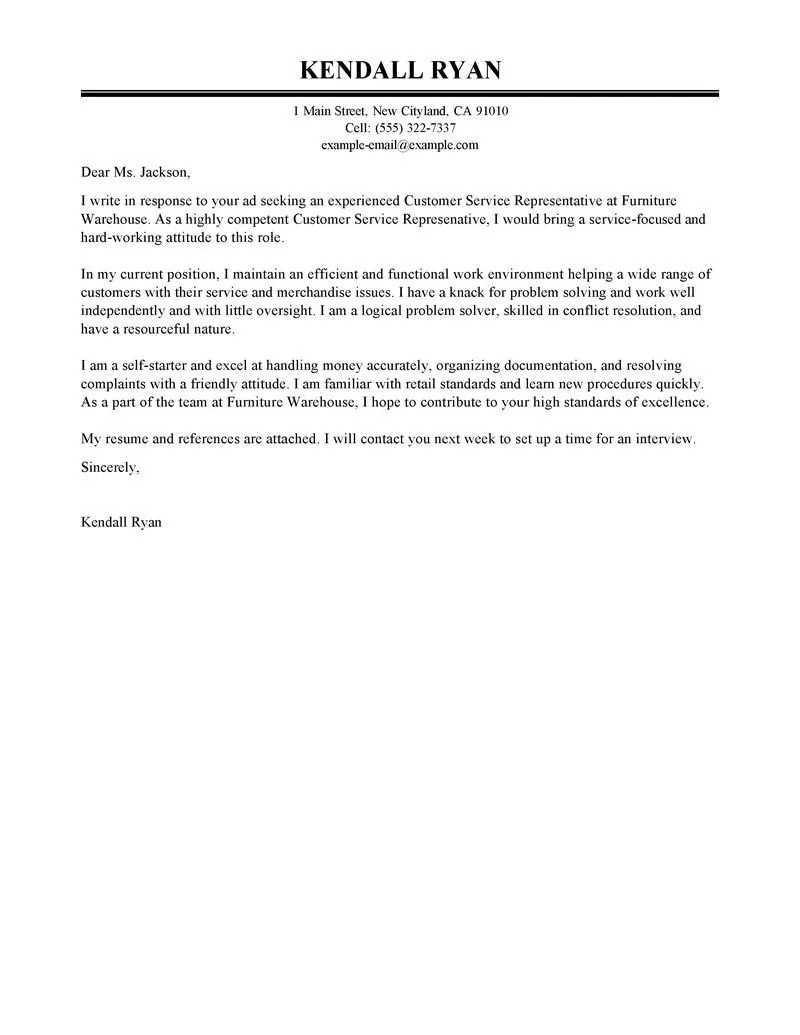Why Cover Letters Matter for Customer Service
In the highly competitive field of customer service, a well-crafted cover letter can be the key that unlocks the door to your dream job. While your resume presents a factual summary of your experience, a cover letter provides a crucial opportunity to showcase your personality, passion, and the specific skills that make you an ideal candidate. Customer service roles thrive on exceptional interpersonal skills and clear communication; your cover letter is the initial chance to demonstrate these attributes. It offers a space to detail how your past experiences have prepared you to excel in customer-facing environments, presenting a proactive approach that goes beyond just listing qualifications. Moreover, a cover letter is your chance to explain any employment gaps or address any potential concerns proactively. Without a cover letter, your application could signal a lack of attention to detail or interest, diminishing your chances of being considered. Therefore, investing time in crafting a great cover letter is essential for career success.
Key Components of a Customer Service Cover Letter
A winning customer service cover letter is built on several core components, each designed to build a compelling case for your candidacy. Start with impeccable contact information and a professional salutation. Then, write a captivating opening paragraph that immediately grabs the reader’s attention, highlighting your understanding of the company and the role. Throughout the body, emphasize your relevant skills and experiences, using examples that highlight problem-solving abilities, effective communication, and a customer-centric approach. Quantify your achievements whenever possible, utilizing numbers and data to demonstrate your impact. Before concluding, express your genuine enthusiasm for the opportunity and underline your knowledge of the company’s mission and values. Finally, end with a clear call to action, requesting an interview, and a professional sign-off. Following these essential elements will help you craft a cover letter that is both informative and engaging, creating a positive impression on the hiring manager.
Contact Information and Salutation

The foundation of any professional cover letter is accurate contact information and an appropriate salutation. Begin by including your full name, address, phone number, and a professional email address at the top. Make sure your email address is professional, as it reflects on you. Next, address the hiring manager by name if possible; research the company’s website or LinkedIn to find the right person. Addressing the hiring manager by name shows you’ve done your research and are detail-oriented. If the name isn’t available, use a professional salutation like “Dear Hiring Manager” or “Dear [Company Name] Team.” Avoid generic greetings like “To Whom It May Concern” as they can come across as impersonal, which may suggest a lack of effort. Ensure all your details are current and correct, as errors here can immediately undermine your credibility. Accuracy in these initial steps sets a positive tone and demonstrates your professionalism and commitment.
Opening Paragraph Capturing Attention
Your opening paragraph is your first chance to make a strong impression and instantly capture the reader’s attention. Avoid generic phrases like “I am writing to express my interest.” Instead, start with a compelling statement that highlights your key qualifications or shows your enthusiasm for the specific role or company. For instance, mention a recent company achievement that resonated with you, or briefly allude to a specific skill or experience that aligns with the job requirements. This demonstrates that you’ve researched the company and understand the role. A strong opening quickly establishes the purpose of your letter, indicates why you’re a suitable candidate, and encourages the reader to continue. Focus on conveying your passion for customer service, emphasizing your understanding of customer needs, and showing how your skills can contribute to the company’s goals. The objective is to create an immediate and positive impact, building a strong foundation for the rest of your application.
Highlighting Relevant Skills and Experience
In the body of your cover letter, focus on highlighting your most relevant skills and experiences that align with the customer service job description. Carefully review the job posting to identify the key requirements, such as communication skills, problem-solving abilities, and experience with specific customer service tools or platforms. Use specific examples to illustrate how you have successfully applied these skills in previous roles. Instead of just listing your skills, provide context by describing the situations in which you used them. For example, instead of writing “Excellent communication skills,” give a brief account of a time you resolved a difficult customer issue through clear and empathetic communication. Include examples of your ability to adapt to different customer needs and your proficiency in managing customer interactions. Tailor your examples to the specific company and role, showing that you understand the challenges and expectations. This makes your application more engaging and highlights the qualities the hiring manager is seeking.
Showcasing Problem-Solving Abilities

Customer service is inherently about problem-solving, so showcasing your ability to resolve customer issues is crucial. Use your cover letter to demonstrate instances where you have effectively identified, analyzed, and resolved customer problems. Describe the challenges you faced, the steps you took to find solutions, and the positive outcomes. Highlight your ability to think critically, remain calm under pressure, and find creative solutions to complex problems. Provide examples of how you’ve used data analysis to identify the root causes of customer issues and how you implemented changes to prevent similar problems from recurring. Demonstrate a proactive approach by going beyond simply reacting to issues and taking initiative to identify areas for improvement. Also, illustrate how you used problem-solving skills to improve customer satisfaction scores, reduce complaints, or enhance the overall customer experience. Emphasize your ability to handle difficult customers with empathy, finding resolutions that leave them feeling valued and understood.
Demonstrating Communication Skills
Excellent communication skills are essential in customer service. Your cover letter should demonstrate your strong communication abilities, both written and verbal. Illustrate how you’ve effectively communicated with customers, colleagues, and supervisors in various situations. Provide examples of your ability to listen actively, speak clearly and concisely, and write professionally. Highlight your ability to adapt your communication style to suit different customers and scenarios. Describe how you used communication skills to explain complex information understandably, de-escalate tense situations, and build rapport with customers. Mention any experience with multilingual communication, as this can be a significant asset. Furthermore, demonstrate your understanding of non-verbal cues and how you leverage them to enhance customer interactions. Ensure your writing is clear, concise, and free of grammatical errors. This in itself proves your written communication skills. Proofread meticulously and ask someone else to review for clarity and accuracy.
Quantifying Achievements and Results
Instead of simply stating your skills and experiences, quantify your achievements whenever possible to demonstrate your impact. Use numbers, percentages, and data to illustrate your accomplishments in previous customer service roles. For example, instead of writing “Improved customer satisfaction,” write “Increased customer satisfaction scores by 15% within six months.” Provide specific metrics showing your contributions, such as the number of customer interactions handled daily, the average resolution time, or the reduction in customer complaints. Quantifying your achievements shows your ability to deliver results and provides concrete evidence of your value. Focus on outcomes that align with the company’s goals. Using data highlights your impact, making a stronger argument for your candidacy and helping the hiring manager understand your contributions better.
Expressing Enthusiasm and Company Research

Demonstrating genuine enthusiasm for the opportunity and showing that you have researched the company is key to making a positive impression. Before writing, explore the company’s website, social media, and news or press releases. Identify the company’s mission, values, and current initiatives. In your cover letter, express your admiration and understanding of the company’s culture and goals. Explain why you’re interested in the role and what excites you about the opportunity. Reference specific aspects of the company that resonate with you, such as its products, services, or commitment to customer satisfaction. Tailor your letter to reflect the company’s identity, proving your genuine interest in joining their team. This demonstrates interest in the job and indicates that you’re likely a good cultural fit.
Call to Action Requesting an Interview
Your final paragraph should include a clear call to action, requesting an interview and stating your availability. Summarize your key qualifications and reiterate your interest in the position. Clearly express your eagerness to discuss your qualifications further and provide your contact information again, including your phone number and email address. Make it easy for the hiring manager to reach you. Suggest a specific action, such as scheduling an interview or providing more information. Avoid being overly assertive; instead, express enthusiasm while maintaining a professional tone. Thank the hiring manager for their time and consideration, reiterating your appreciation for the opportunity. By ending with a direct call to action, you encourage the next step, increasing your chances of getting an interview.
Closing and Professional Sign-off
The closing should be professional and polished, leaving a positive final impression. Begin your closing with a formal sign-off, such as “Sincerely,” “Respectfully,” or “Best regards.” Avoid informal closings like “Thanks” or “Cheers.” After the sign-off, leave space for your handwritten signature if you’re submitting a printed copy. If submitting electronically, ensure your name is clearly visible below the sign-off. Proofread your entire cover letter one last time, paying close attention to grammar, spelling, and punctuation. Ensure your contact information is accurate and formatting is consistent. A professional closing shows attention to detail, creating a well-crafted document. This final impression can significantly impact how the hiring manager views your application, increasing your chances of success.
